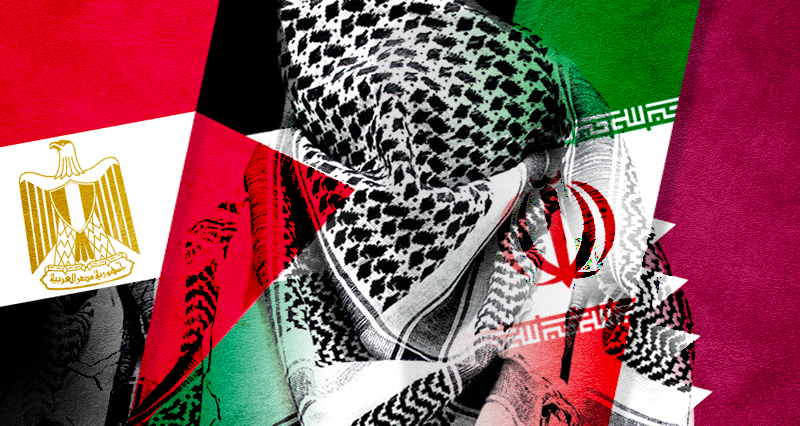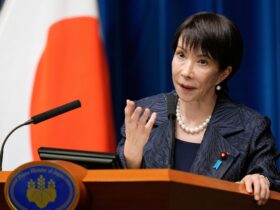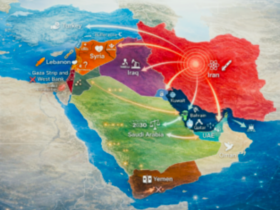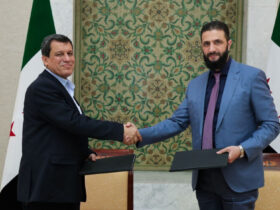By Nardine Ali (Cairo/Egypt)
Cairo has recently signalled intensifying interest in negotiations between Israel-Palestine, a potential indication of the country’s desire to restore its historic role as the broker of the 73-year old conflict.
On January 18, Egypt’s President Abdel Fatah Al Sisi headed to the Jordanian capital Amman to meet with King Abdullah II. A series of meetings were held which included the top officials of both countries, as well as European officials, a sign that the frozen peace talks between the Palestinians and Israelis might soon resume. This was preceded by a visit made by the head of the Egyptian Intelligence, Abbas Kamel, to Ramallah, where he met with the President of the Palestinian Authority Mahmoud Abbas (Abu Mazen). Abbas has called for parliamentary elections to be held on May 22 and presidential election on July 31, according to Youm7.
Prior to Sisi’s visit, the Egyptian capital hosted a quartet meeting between the foreign ministers of Egypt, France, Germany, and Jordan on January 11 to coordinate the efforts between the four countries to push forward with the Middle East peace process, according to Akhbar Elyoum.
“They [the four foreign ministers] emphasized that the resolution of the Palestinian-Israeli conflict on the basis of the two-state solution is an indispensable requirement to a comprehensive peace in the region,” the Egyptian foreign ministry said in an official statement following the meeting, ensuring an independent and viable Palestinian state based on June 4, 1967 lines and UN Security Council resolutions. This was a strong sign they would be dismissing Trump’s so-called the Deal of the Century.
The Palestinian factions are set to meet in Cairo within days, according to Palestinian sources, who underlined that the meeting will focus on the logistics of the upcoming elections and assurances of the Palestinian Authority to hold transparent, democratic election hat can unify all Palestinians behind one elected government and to be represented by democratic-elected legislative entity.
The upcoming elections, the first since 2006 and the third in 25 years, face several challenges, according to the Palestinian journalists, Rajab Al Madhoun.
In his report for the Lebanese newspaper Al Akhbar, Al Madhoun says that the first challenge is the representation of each faction, Fatah, Hamas and the Palestinian Liberation Organization (PLO), and how they will be fairly represented in the parliament. The second challenge is the transparency of the elections and judicial observation, which Hamas is skeptical of, since it submits to a special judiciary system different from the one in Ramallah and the West Bank.
Another challenge, according to Al Madhoun, is that East Jerusalem submits to the control of the Israeli occupation, which makes it quite difficult to assure the transparency of the elections, especially given that the Israeli authorities have not yet responded to the Palestinian request to let the Palestinian living in Jerusalem to vote or run for a seat in the parliament.
The Palestinian political scene is severely complicated and subject to outer powers and countries, which makes most Palestinians, civilians and politicians, anything but optimistic about the upcoming elections. They are seeing no real change on the ground, and the power will likely remain in the hands of both Fatah and Hamas with no real participation of the Palestinian people to determine their own fate. It is, however, certain that all the foreign, regional and domestic powers are determined to resume the peace talks and to stop the annexation policy of Tel Aviv that was granted to it by the Trump administration.
It is also certain that Egypt is the key to all these negotiations and the historic mediator between all parties of the Palestinian-Israeli conflict.
Egypt, Qatar to restore diplomatic ties after 3-year feud
Egypt announced on January 20 that they would resume diplomatic relations with Qatar, ending a three-year feud with the Gulf emirate.
The move follows the Al-Ula Declaration that was inked in the latest Gulf Cooperation Council (GCC) summit last month in Saudi Arabia, where the boycott quartet, Egypt. Saudi Arabia, Bahrain and UAE agreed to normalize ties with Qatar.
On January 18, the first Egyptian flight took off from Cairo to Qatar after a 3-year of closing the airspace for all Qatari flights.
“In relation to the implementation of the mutual commitments at Al-Ula statement, the Arab Republic of Egypt and the State of Qatar exchanged, today, January 20, two official memoranda, according to which the two countries agreed to resume diplomatic relations,” Egypt’s Foreign Ministry said in an official statement.
The ministry has not revealed in its statement the level of the diplomatic representation that will be restored, nor the conditions of the agreement and whether Doha will execute Egypt’s conditions that were announced at the beginning of the feud.
Egypt’s conditions were shutting down Aljazeera, Qatar’s propaganda tool, or at least toning down its critical voice against the government in Egypt, ditching the Muslim Brotherhood elements and extraditing their fugitives to be tried in Egypt, as many of them face terrorism-related charges.
Qatar will probably ditch the support of the Muslim Brotherhood, in accordance with its future agenda and its interests with the GCC and Egypt from one side, and with the new US administration from the other. Given that Biden’s administration might be interested in having a strong alliance in the Middle East to back his stance against Iran, which he wants to force back to the negotiations table.
“The emirate is now appraising its situation and where it stands from the new reconciliation with its Arab neighbor,” the political affairs expert at the German Institute for Global and Area Studies (GIGA), Hagar Ali told DW on January 23, adding that the fate of the Muslim Brotherhood in Qatar remains ambiguous and open for all options. “However, they still have the support of the Turkish President Recep Tayyip Erdoğan, whose party is ideologically connected to the brotherhood.”
“The Muslim Brotherhood key members have lost their role as acting political elements in most of Arab countries; they now move toward remaining as a political ideological movement,” Ali added.
When asked about Doha’s backing for Islamist political movements, which the quartet considers a threat to their stability, he said “we are going to support whatever the people will and whatever the people are going to seek for their countries. If they are going to seek for justice using peaceful ways to express what they think is right, Qatar will continue supporting the people.”
Weeks after the reconciliation, Qatar has proposed to broker talks between Gulf countries and Iran, saying the time is right for the neighbors to patch up their own differences.
In an interview with Bloomberg on January 19, Qatari Foreign Minister Sheikh Mohammed bin Abdulrahman Al Thani said his government was “hopeful that this would happen and we still believe this should happen.”
“This is also a desire that’s shared by other GCC countries,” he added.
The call was well received by Iran, its foreign minister Mohammad Javad Zarif declared that “Tehran is ready for dialogue with the Gulf states in response to Qatar’s or previous invitation from Kuwait.”
“We have always extended the hand of friendship to the Gulf states, because this region belongs to all its countries and ensuring its security for the benefit of everyone, and destabilizing the region’s security only serves a special group,” Zarif told Iranian TV.
The top Iranian diplomat blamed the Gulf neighbors for not starting the negotiations earlier and waiting for the end of Trump’s time in office. “The Gulf countries lost a four-year opportunity for dialogue with Iran, and now Trump is gone, and we and the Gulf states remain,” he said.
Speaking to Alarabiya, Saudi Foreign Minister Faisal bin Farhan Al Saud said he has not ruled out the intention to start talks with Iran, conditioning such a step with Iran proving they will change their approach in the region.
“Saudi Arabia has previously entered into talks with the Iranians, but they backed out their commitment,” Bin Farhan told a Saudi TV channel. “We must find real indicators to change in their approach in the region and their support to the terrorist organizations, and so far, we have not witnessed this,” the Saudi prince added.
Saudi Arabia has shown flexibility in cooperating with Biden’s administration to reform the 2015 nuclear deal signed by former president Barack Obama, to attempt to avoid the old deal’s flaws.

















Leave a Reply